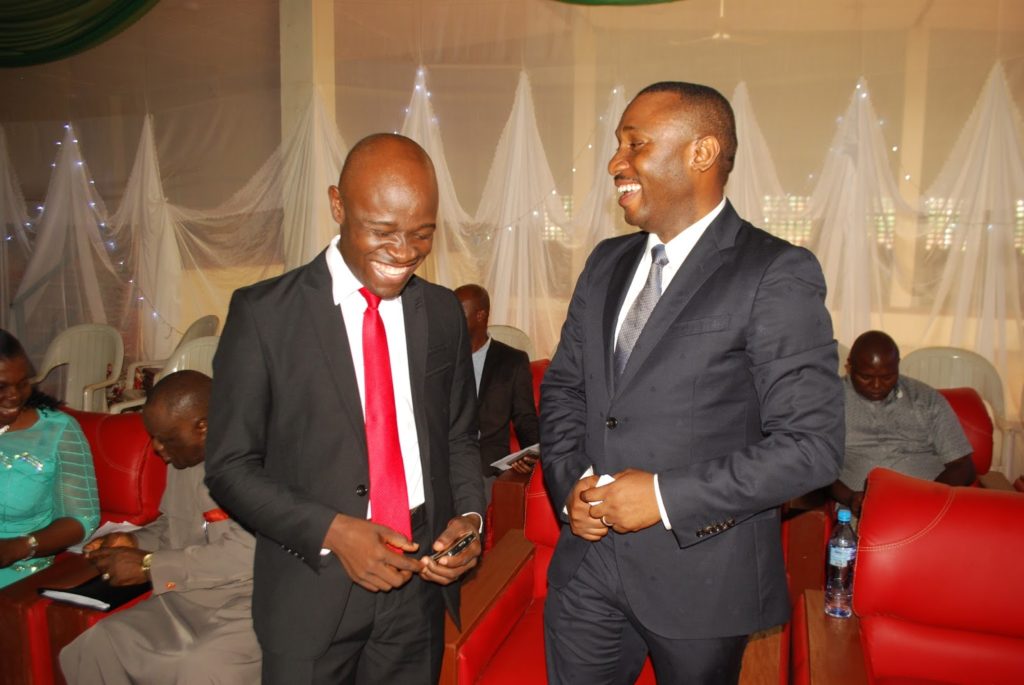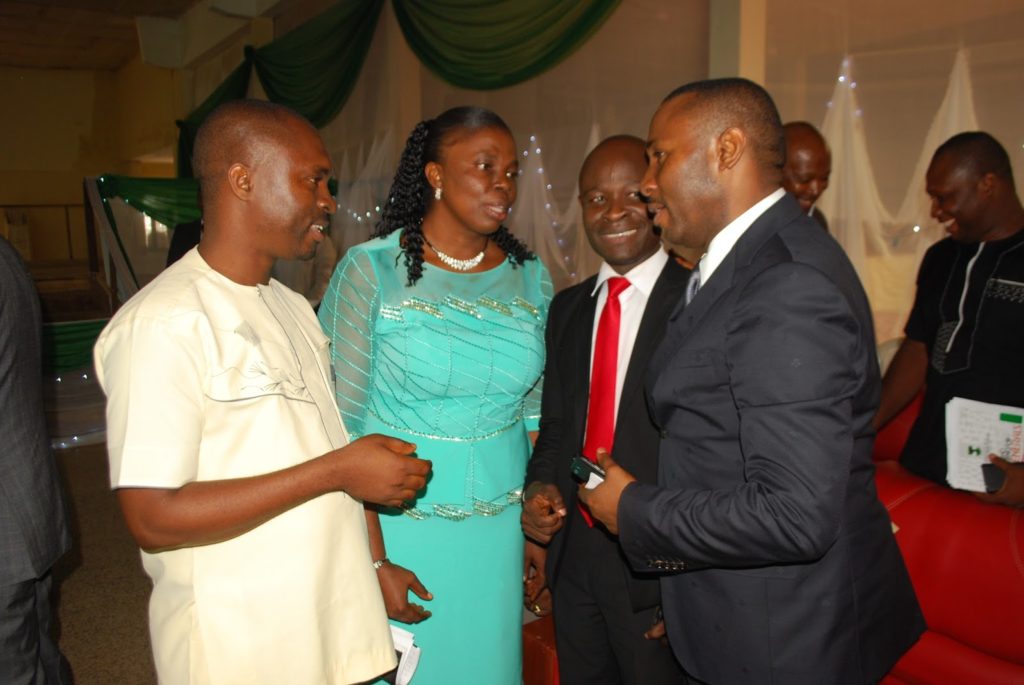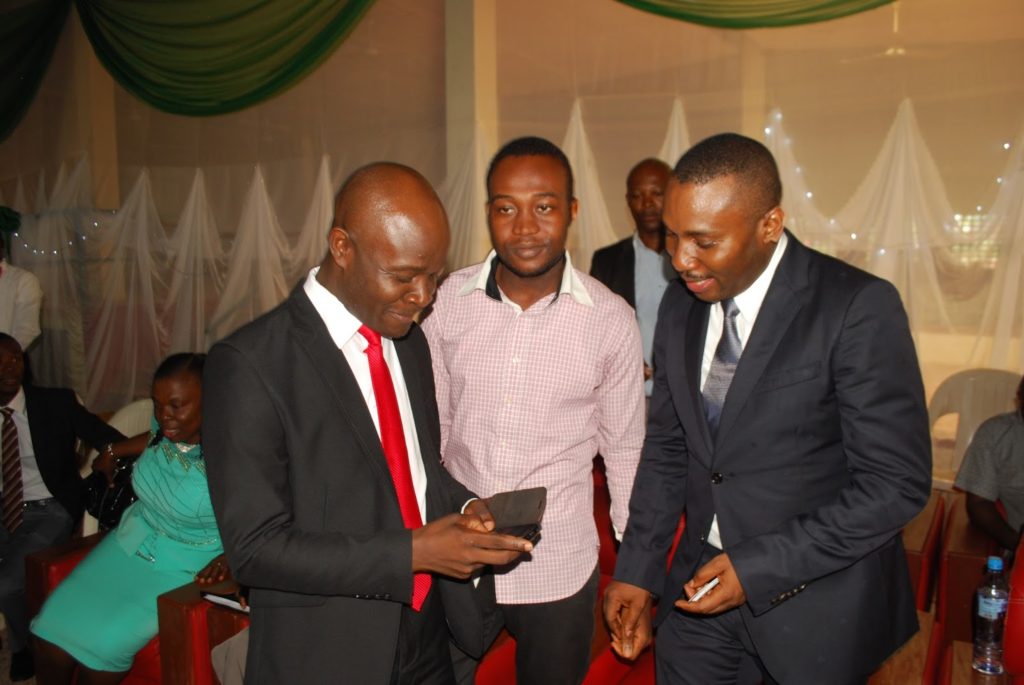The Department of Economics on Saturday, July 22, 2017 concluded its 2nd Homecoming event, which took place in Ekpo Ref, UNN. Among others, this event featured paper presentations by His Excellency, Mr Godwin Emefiele, Governor, Central Bank of Nigeria; His Excellency, Rt. Hon. Ifeanyi Ugwuanyi, Governor, Enugu State and Rt. Hon. Ferdinand Dozie Nwankwo of Federal House of Representatives Abuja.Dr Tony Orji, of Economics department anchored the event.More photos after the cut
Photos:Dr Tony Orji With Hon Dozie Nwankwo At The Second Gathering Of Eco-Generals In Ekpo Ref
A
A
Comments 3
Leave a Reply Cancel reply
Subscribe For Updates
RCCG 2022 JANUARY SHILOH HOUR
Video Player
Categories
Tags
African scholarship
Assignment
Assingnment And Quiz
award
Call for Papers
Capacity Building
Career
Careers
Conference
empowerment
encouragement
Entertainment
Fellowship
funding
Grant
grants
ICT Updates
INews
Inspiration
JOBS
leadership
Lifestyle
message
motivation
News
Nigeria
opportunities
Opportunity
Post Doc Fellowship
Post Graduate
Post Graduate Scholarship
Publication
Quiz
Recruitment
Research
scholarship
Scholarships
Seminar
Socio-Economic Issues
Sports Update
VACANCIES
Vacancy
Wealth Creation
Women
Workshop
Recent Comments
- Ubi grace kamsiyochukwu (2022/244636) on SUCCESS TONICS ESSAY INT”L COMPETITION, JUNE 2024 DIFFERENT PRIZES TO BE WON–CLICK HERE)
- Ojobo maureen Onyemaechi on SUCCESS TONICS ESSAY INT”L COMPETITION, JUNE 2024 DIFFERENT PRIZES TO BE WON–CLICK HERE)
- Ogbolu Racheal Udoka on SUCCESS TONICS ESSAY INT”L COMPETITION, JUNE 2024 DIFFERENT PRIZES TO BE WON–CLICK HERE)
- Ogbolu Racheal Udoka on SUCCESS TONICS ESSAY INT”L COMPETITION, JUNE 2024 DIFFERENT PRIZES TO BE WON–CLICK HERE)
- Ogbolu Racheal Udoka on SUCCESS TONICS ESSAY INT”L COMPETITION, JUNE 2024 DIFFERENT PRIZES TO BE WON–CLICK HERE)
About Dr. Anthony Orji
Dr Anthony Orji
Senior Lecturer, Economics, UNN
Dr Anthony Orji is a Ph.D holder in Economics and a lecturer at the Department of Economics, University of Nigeria Nsukka.
He obtained his B.Sc, Msc and Ph.D Degrees from the University of Nigeria, Nsukka and a Post Graduate Diploma in Sustainable Local Economic Development (SLED) from Erasmus University, Rotterdam Netherlands.

Categories
- Assignment And Quiz (127)
- Conferences (45)
- Empowerment (220)
- Entertainment (214)
- Featured (224)
- ICT Update (142)
- INews (1,370)
- Inspiration (415)
- Jobs and Vacancies (336)
- Lectures and Seminar (57)
- Lifestyle (508)
- NESA-UNN (169)
- News (1,666)
- Publications (62)
- Scholarships (728)
- Socio-Economic Issues (1,201)
- Sports Update (93)
- Uncategorized (1,341)
- Workshops and Seminars (58)
Tag Cloud
African scholarship
Assignment
Assingnment And Quiz
award
Call for Papers
Capacity Building
Career
Careers
Conference
empowerment
encouragement
Entertainment
Fellowship
funding
Grant
grants
ICT Updates
INews
Inspiration
JOBS
leadership
Lifestyle
message
motivation
News
Nigeria
opportunities
Opportunity
Post Doc Fellowship
Post Graduate
Post Graduate Scholarship
Publication
Quiz
Recruitment
Research
scholarship
Scholarships
Seminar
Socio-Economic Issues
Sports Update
VACANCIES
Vacancy
Wealth Creation
Women
Workshop
Success Tonics Blog © 2022 - All Rights Reserved.








UDIDA THERESA ALORYE
REG:2016/SD/36048
DEPT:EDU.ECONOMICS
DIFFERENCES BETWEEN TRADITIONAL AND POLITICAL ECONOMY
Traditional economy is an original economic system in which traditions, customs, and beliefs help shape the goods and the services the economy produces, as well as the rules and manner of their distribution. Traditional economies depend on agriculture, fishing, hunting, gathering or some combination of the above. They use barter instead of money. Most traditional economies operate in emerging markets and developing countries. Economists and anthropologists believe all other economies got their start as traditional economies. Thus, they expect remaining traditional economies to evolve into either market, command or mixed economies over time. In traditional economy, They use traditions gained from the elders' experiences to guide day-to-day life and economic decisions. most traditional economies produce only what they need. There is rarely surplus or leftovers. That makes it unnecessary to trade or create money. hen traditional economies do trade, they rely on barter. It can only occur between groups that don't compete. For example, a tribe that relies on hunting exchanges food with a group that relies on fishing. E.t.c
Political economy is a term used for studying production and trade, and their relations with law, custom, and government, as well as with the distribution of national income and wealth. As the name suggests, political economy is concerned with how political forces influence the economy and economic outcomes. it is economic activity that generates the resources that are required to sustain political activity, for example, election campaign expenses. Moreover, whilst policy might lead to a certain economic activity prospering, this success in itself can generate a political constituency with an interest in maintaining the economic activity, because a sizeable number of people now benefit from it. Political economists are very interested in who gains and who loses from a particular policy. This is likely to provide important clues as to which groups or individuals support the continuation of the policy, as well as to which groups might be drawn into a coalition seeking to change it.
TRADITIONAL ECONOMY AND POLITICAL ECONOMY: A DISCOURSE
Tradition Is Cherished: Traditional economies still produce products and services that are a direct result of their beliefs, customs, traditions, religions, etc. Vast portions of the world still function under a traditional economic system. These areas tend to be rural, second- or third-world, and closely tied to the land, usually through farming. However, there is an increasingly small population of nomadic peoples, and while their economies are certainly traditional, they often interact with other economies in order to sell, trade, barter, etc.
Minimal Waste: Traditional economies would never, ever, in a million years see the type of profit or surplus that results from a market or mixed economy. In general, surplus is a rare thing. A third-world and/or indigenous country does not have the resources necessary (or if they do, they are controlled by wealthier economies, often by force), and in many cases any surplus is either distributed, wasted, or paid to some authority that has been given power (investopedia.com).
In Political Economy; the two fundamental aspects of political economies are:
1. Private ownership of the means of production
2. Voluntary exchanges / contracts
The most common title associated with a political economy is capitalism. Individuals and businesses own the resources and are free to exchange and contract with each other without decree from government authority. The collective term for these uncoordinated exchanges is the "market." (Leroux, 2011)
Prices arise naturally in a market economy based on supply and demand. Consumer preferences and resource scarcity determine which goods are produced and in what quantity; the prices in a market economy act as signals to producers and consumers who use these price signals to help make decisions. Governments play a minor role in the direction of economic activity.
In addition, under a political economy, governments own all of the factors of production such as land, capital, and resources, and government officials determine when, where and how much is produced at any one time. This is also sometimes referred to as a "planned economy." The most famous contemporary example of a command economy was that of the former Soviet Union, which operated under a communist system (Leroux, 2011).
Tradition Is Cherished: Traditional economies still produce products and services that are a direct result of their beliefs, customs, traditions, religions, etc. Vast portions of the world still function under a traditional economic system. These areas tend to be rural, second- or third-world, and closely tied to the land, usually through farming. However, there is an increasingly small population of nomadic peoples, and while their economies are certainly traditional, they often interact with other economies in order to sell, trade, barter, etc.
Minimal Waste: Traditional economies would never, ever, in a million years see the type of profit or surplus that results from a market or mixed economy. In general, surplus is a rare thing. A third-world and/or indigenous country does not have the resources necessary (or if they do, they are controlled by wealthier economies, often by force), and in many cases any surplus is either distributed, wasted, or paid to some authority that has been given power (investopedia.com).
In Political Economy; the two fundamental aspects of political economies are:
1. Private ownership of the means of production
2. Voluntary exchanges / contracts
The most common title associated with a political economy is capitalism. Individuals and businesses own the resources and are free to exchange and contract with each other without decree from government authority. The collective term for these uncoordinated exchanges is the "market." (Leroux, 2011)
Prices arise naturally in a market economy based on supply and demand. Consumer preferences and resource scarcity determine which goods are produced and in what quantity; the prices in a market economy act as signals to producers and consumers who use these price signals to help make decisions. Governments play a minor role in the direction of economic activity.
In addition, under a political economy, governments own all of the factors of production such as land, capital, and resources, and government officials determine when, where and how much is produced at any one time. This is also sometimes referred to as a "planned economy." The most famous contemporary example of a command economy was that of the former Soviet Union, which operated under a communist system (Leroux, 2011).